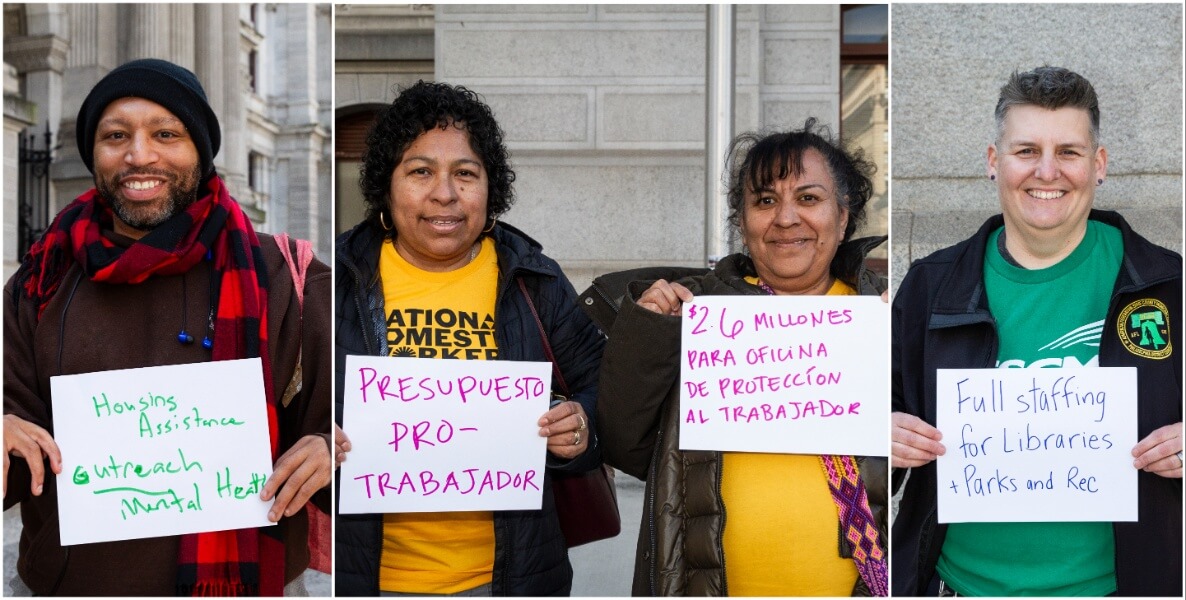Americans are more afraid of public speaking than they are of spiders, wildfires, being unemployed and even death.
And yet each budget season, Philadelphia City Council asks citizens to offer their thoughts on the city’s latest round of funding priorities by inviting them to speak in front of a room of elected officials, staff and the public. If that’s not scary enough, those citizens are given only up to three minutes to make their points, knowing well that whatever they say will be livestreamed and later recorded to exist online for the world to see.
Although the budget is arguably the most influential piece of legislation the City produces each year — it guides strategic investments into new programs, while determining the clout of existing departments — it’s also pretty boring. (Line items, decimals, blah, blah, blah.) Once you throw in the fact that the opportunities for giving official public testimony are inconvenient, occurring during the traditional workday, it’s a miracle anyone offers their two cents.
“There is flawed thinking about budget engagement, which has always been: How do we get people to meet us where we are? Instead of asking, How do we meet people where they are?” — Denise Riedl, South Bend’s chief innovation officer
Of course, it’s not just a Philly thing. Citizens all over the country face the same constraints and hurdles when trying to participate in municipal budget hearings every year. Yet some cities have changed up their approach, building more accessibility into the process or experimenting with direct democracy in their allocation of some city funds.
“There is flawed thinking about budget engagement, which has always been: How do we get people to meet us where we are? Instead of asking, How do we meet people where they are?” says Denise Riedl, the chief innovation officer for South Bend, Indiana.
Just try something new
Back in 2019, Riedl wasn’t the only person in South Bend reconsidering the potential of the budgeting process to stimulate civic engagement. That November, the city elected James Mueller as its new mayor, replacing current U.S. Secretary of Transportation Pete Buttigieg.
Having served under Buttigieg as chief of staff and then as director of community investment, Mueller had gone through multiple budget cycles that had generated underwhelming amounts of public feedback. At previous years’ budget hearings, it was typical for only one or two residents to testify.
“I got the green light from the mayor to just experiment,” says Riedl. “The mayor was like, Just try something new. What’s going to happen? We have worse engagement?”
Riedl got to work designing a program to improve citizen feedback into the budgeting process, one that would aim to increase input, demystify the process and make budgeting fun.
“We work with folks to imagine what a fully funded city would look like. If we weren’t operating out of the scarcity model, if we were operating out of a place of abundance, well, what would our city look like? What are the possibilities for what we could fund?” — Phoebe Bachman, Mural Arts Philadelphia
Instead of asking people to show up to a budget hearing during the daytime, Riedl and her team created a blueprint for tapping into existing forms of communication between the city and its residents, which could be leveraged for input into the budget. For starters, they established a dedicated voicemail inbox for the budget and trained South Bend’s 311 operators on how to direct people towards it. If a person called to complain about a pothole or a noise complaint, the operators would encourage those residents — and then transfer them to the voicemail — to share their additional thoughts on how the city should be spending its money, such as putting it towards street maintenance or noise reduction. They also sent out a digital survey for the public that posed a list of funding priorities.
On top of that, a new “Build the Budget” feedback program went to outdoor festivals and farmers markets, where they set up tables offering information and budget-related games. The most popular was a game that gave residents a fictional $100 to allocate among various city departments and programs, providing a physical representation of the limited public resources that actually existed in South Bend.
“We are a very Democratic city, so people don’t mind spending money for things. But the hard part is the trade-offs, right?” says Riedl. “What should we do over something else?”
They also ran a budget trivia game, which had nothing to do with generating input and everything to do with creating a fun, accessible way to start a conversation on a dry government topic. (T-shirts were incentivizing prizes.)
In its first year, the feedback program exceeded expectations, generating 807 responses from residents, including 324 voicemail messages. It also provided baseline data that, year over year, tracked shifts in public opinion. Between the first and second year of the program, there was an uptick in people expressing the need for more violence intervention initiatives in South Bend. Based on the $100 game, that specific category jumped from fourth to second among all the priorities listed. In small ways, Mueller’s next budget reflected that shift — by hiring an additional violence prevention coordinator within the city, investing in specific community programs focused on violence reduction, and bringing the police department up to full staffing for the first time in a decade.
Riedl recalls that many of the public responses aligned with what the Mueller administration already had planned, but the insights made subtle differences in the subsequent budgets. And the more data they continue to gather, the more they can isolate insights on a hyper-local basis. “In the case of the digital form, we could actually segment that out by district, which showed us that this district cared the most about this topic, and all of these districts had either different or common top threes,” Riedl says.
The feedback program also arrived at an auspicious time. When President Biden signed the American Reinvestment Plan Act, South Bend used the system that Riedl had set up in order to get citizen input about how to spend the $59 million allocated to the city.
“And so we kind of used budget season as a dual purpose to not only shape the 2022 budget, but to actually shape how we spent our American rescue dollars,” says Riedl. “This is one of the most important civic engagement moments of the year, the budget process. For some reason, we [previously] weren’t getting a lot of engagement. But now we knew residents cared.”
Will Mayor Parker continue Philly’s budget engagement experiment?
Now in its fourth year, South Bend’s Build the Budget program offers clues for how to stimulate more civic engagement in the City of Brotherly Love — which is not to say we’re starting from scratch.
Philly has experimented with engagement strategies around the budget over the past four years, although the task is invariably more challenging in a city much larger and far more diverse than South Bend. To draw a comparison, the population of Philadelphia is 15 times larger than South Bend. Mayor Cherelle Parker’s first budget was proposed at $6.29 billion, whereas Mueller’s latest budget for South Bend was just $417 million.
Still, in the wake of George Floyd’s murder in 2020, Philly was among several major cities that began experimenting with “participatory budgeting” policies. First introduced in Brazil in the 1980s, participatory budgeting is a form of direct democracy that gives residents the power to vote on a portion of how public dollars get spent. In Philly, the amount set aside by former Mayor Jim Kenney for participatory budgeting was a mere $1 million.
Instead of asking residents to do the budgeting themselves for a small chunk of cash, maybe it’s more democratic to canvas the public for ideas on the whole ball of wax? “A million dollars is a really important amount of money, but it’s also not enough to necessarily make the changes that people want to see in their communities and across a city as large as Philadelphia,” says Phoebe Bachman, the lead artist behind a four-year-old program called The People’s Budget, which is funded by Mural Arts Philadelphia.
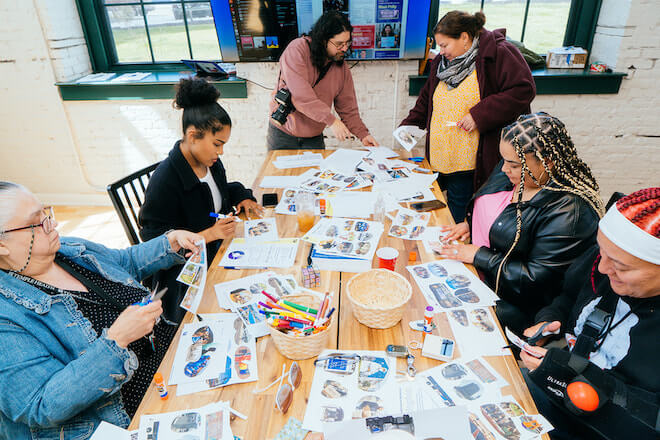
Launched in 2020, the program began as Stitching Our Futures during the pandemic. The first year, it consisted of Bachman and a team of artists working with residents to create quilts that reflected their budgeting priorities. It echoed Mural Arts’ mission of using artmaking as a means of engaging people in something like the (snore-worthy) city budgeting process. Though they were not formally used to collect data for city officials, the quilts did help foster a relationship with the Kenney administration, whose budget office saw the potential of Bachman’s work to engage and educate residents on the dense budgeting process.
Four years later, The People’s Budget is now a citywide initiative. Mural Arts is in the process of hosting five neighborhood-based workshops to gather residents’ opinions on budgeting priorities, which will inform a roundtable discussion inside City Hall on April 25. That event, which is being hosted in partnership with Councilwoman Kendra Brooks’s office and the Philadelphia Revenue Project, will feature the voices of business owners, advocates, and city workers who’ll speak to their thoughts on the budget — without the normal formalities of a City Council hearing.
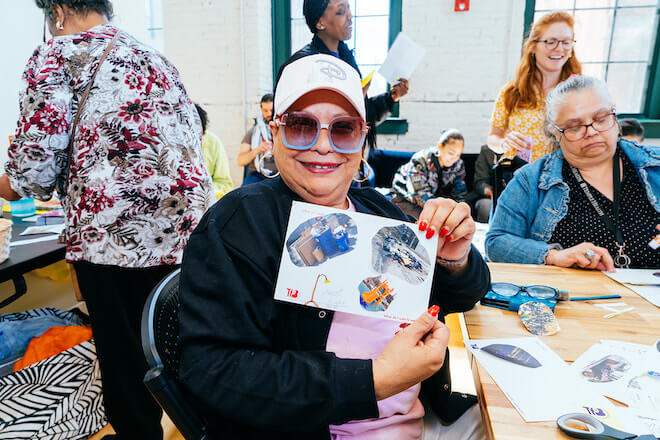
Starting in May, as they did last year, Bachman and a team of artists will operate a month-long office inside a shipping container located in LOVE Park, which will be home to events and engagements for Philadelphians to learn about the budget and give their feedback.
“We knew that it was really important for folks to learn how to advocate for what they wanted to see funded,” says Bachman. “So once they learn about how the city budget process works, we work with folks to imagine what a fully funded city would look like. If we weren’t operating out of the scarcity model, if we were operating out of a place of abundance, well, what would our city look like? What are the possibilities for what we could fund?”
Over the past few years, City budget officials have trained Bachman and the other artists on the ins and outs of the process, so that they, in turn, can be a resource for the public. That relationship has grown to the point that the project has established itself as a de facto community engagement arm for the City, including The People’s Budget Resource Center, a dedicated online database that provides links to everything from key dates in budget season to video tutorials created by the City on how to advocate as a citizen.
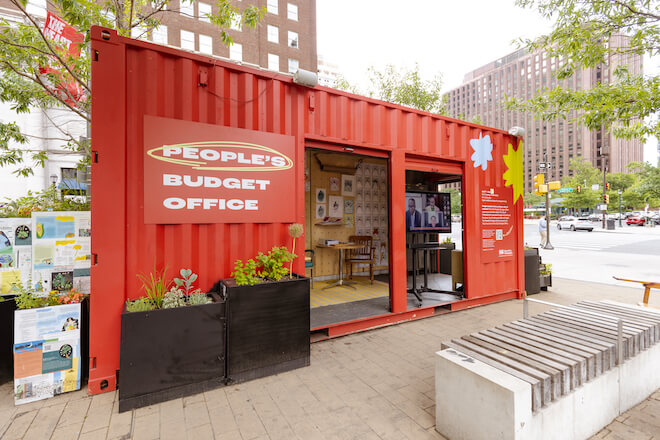
Bachman jokes that she could have never imagined spending four years on something so mundane on the surface. But she says she’s seen a major impact with the work, and now views the budget as an imaginative document. “These workshops become this place where people are talking about everything,” she says. “People are talking to me about affordable housing, about more lights in their neighborhoods, cleaning their streets, the trash pickup, the pool that’s around the corner from their house … rather than just doing a focus group on policing, or just a focus group on Parks and Rec, I think this a really interesting project because you actually start to see the intersections of how the city funnels into our lives or intersects with our lives.”
While the collaboration between the city and Mural Arts has grown over the years, the new mayoral administration has not yet indicated its intentions for future participation. The Parker administration did not respond to repeated requests for comment on its strategy for public engagement in the city budget.
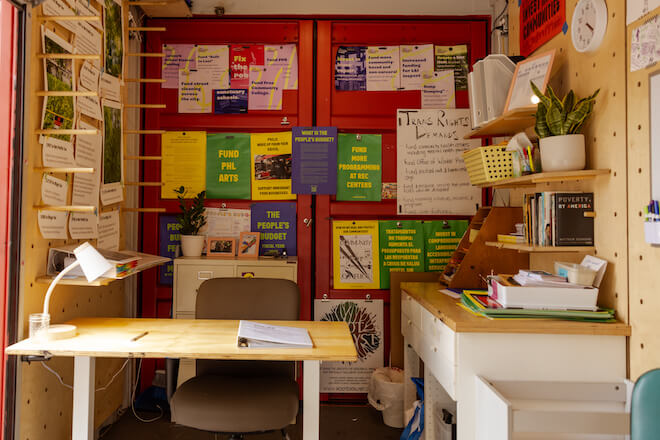
But the positive impacts of a robust feedback program on the budget are not hard to grasp, as witnessed in South Bend. After years of low turnout with public testimony, that city spent years trying to boost engagement by hosting small forums in various neighborhoods. Ultimately, the Build the Budget strategy has negated the need to even do that. “Last year, we actually had such an overwhelming amount of participation at [existing] public events that we didn’t really need to hold [separate budget] events,” says Riedl.
Now that it’s established, Riedl estimates the entire program costs somewhere in the neighborhood of $5,000 per year in South Bend, excluding the manpower of existing employees who work on the project.
Perhaps the best outcome has been an innovative streak that’s taken hold inside South Bend’s City Hall, and a spirit of trying new things. Maybe Philly could take a page from their book. “That’s something that we’re really keen to do: Is there another city doing something cool, which we can copy?” Riedl says.
![]() MORE IDEAS WE SHOULD STEAL
MORE IDEAS WE SHOULD STEAL



